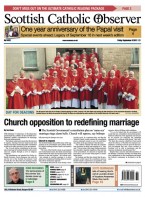July 15 2011 | ![]() 0 COMMENTS
0 COMMENTS ![]() print
print

Why a free press is a force for good
Publication Date: 2011-07-15
— As the phone-hacking scandal rages on, we analyse both the positive and negative sides of the UK press
By Kevin McKenna
WHEN a wave of moral indignation occasionally washes over Britain I run for cover to avoid getting wet. We are in the middle of one right now and it won’t be safe to come out for some time yet. As the full extent of the News of the World phone-hacking scandal unfolded last week each day brought another shocking revelation. By the weekend the reputation of journalists was firmly in the gutter, a change from the cesspool where it usually resides in the public imagination.
First of all, and for the avoidance of doubt, let me state here and now that phone hacking has never taken place in the Catholic media. We have no need of stooping to such wicked depths of depravity to elicit information from our hierarchy… a wee genuflection, followed by a scone and butter and a promise to carry a nice picture about the diocesan pilgrimage to Lourdes usually does the trick.
I don’t want to appear callous and insensitive about the undoubted distress that some of Rupert Murdoch’s employees have caused innocent members of the public. Yet, such has been the near 24/7 outrage pouring from every politician that a disaster of catastrophic proportions had taken place. Nothing of the sort has occurred. It has been revealed that on one newspaper a climate of securing information by any means possible existed for several years.
Furthermore, it would appear that the police turned a blind eye to it when they first found evidence of it. And so desperate were political leaders to win Mr Murdoch’s endorsement that his newspapers could have advocated free heroin for every reader and they would have turned the other way.
Now though, they are all trying to outdo each other in finding the most coruscating words in their limited lexicons with which to condemn the Murdoch empire in particular and newspapers generally. There are many powerful people in this country who have good reason to hate the UK press. Now they see a heaven-sent opportunity to severely restrict its activities. Others among us, owing to last week’s events, feel that the media is out of control and must be gelded. Yet we should all be careful what we wish for (as I’m sure it says in Ecclesiasticus somewhere).
A free press is a force for good and in the UK we have the best newspapers in the world. There is much information that very rich and very powerful people do not want us to possess. We would be in ignorance of their activities if we did not have an independent press to shine a torch on them.
The full extent of apartheid in South Africa and the shocking revelations about the Thalidomide drug for pregnant women were two of the earliest examples of how journalism can hold the masters of the universe to account. Stories such as these made me want to become a journalist.
I utterly reject the view held by some influential Catholics, who really ought to know better, that many of our newspapers are fundamentally anti-Christian. This is sophistry and perhaps also wishful thinking.
Almost each week the secular press will reveal examples of Christianity being suppressed wherever it occurs in the world. Certainly, newspapers will give space to commentators who reject our Faith. But we live in a democracy and, instead of wringing our hands, we ought instead to concentrate on articulating properly what we believe.
The only people who will gain if our great newspapers have draconian restrictions placed upon them will be tyrants and torturers, the corrupt and the wicked. Many such as these wield power in this world and they must be held accountable for their actions. No one is better at doing that than the British media.
— Kevin McKenna is former deputy editor of the Herald and former executive editor of the Daily Mail in Scotland. He is currently a columnist for the Guardian










